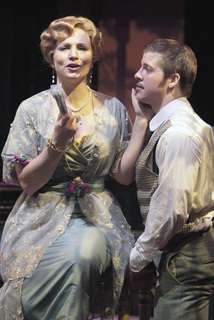|
Back
Strauss’ Capriccio Honed to Perfection in Philadelphia Philadelphia
Helen Corning Warden Theater
02/20/2010 - & February 23, 25, 27, March 2, 2010
Richard Strauss: Capriccio, opus 85
Jan Cornelius (Countess) Alex Lawrence (Count), Cynthia Cook (Clairon), Zach Borichevsky (Flamand), Christopher Bolduc (Olivier), Scott Conner (La Roche), Sean Arnold (Monsieur Taupe), Maria Aleida (Italian Singer), Taylor Stayton (Italian Singer, Servant), Zachary Nelson (Majordomo), Anhara Webb (Tanzmeister), Ryan Kuster, Steven LaBrie, John Viscardi (Servants), Erika Mero (choreographer and dancer)
Academy of Vocal Arts Orchestra, Luke Housner (music director and accompanist)
Dorothy Danner (stage director)

J. Cornelius & C. Bolduc (© Paul Sirochman)
Aside from an occasional Ariadne auf Naxos or Salome, Philadelphia audiences have had little opportunity to hear the operas of Richard Strauss in recent decades. Following up his successful performances of Elektra for the Academy of Vocal Arts several years ago, Luke Housner has prepared a delectable production of Capriccio that drew enthusiastic approval on opening night from a capacity audience in the Helen Corning Warden Theater. Presiding at the keyboard, Housner revealed the lyrical beauty of Strauss final opera, or “conversation piece for music,” as the composer and his librettist, Clemens Krauss, preferred. Yes, one could miss the masterful orchestration as well as the instrumental detail of the full score, but Housner played with such compelling beauty and musical mastery it hardly mattered. He honed his talented cast into a taut ensemble. The big concerted numbers unfolded with rare precision but also with a passionate edge. Housner shaped this long score with a fine feel for the climaxes and also underlined the soaring lyricism in Strauss’ music.
Stage director Dorothy Danner exploited the late 19th-century beauties of AVA’s elegant Helen Corning Warden Theater for her production. In her vivid staging, Danner set the action against the theater’s rich architectural details and its historic paintings and friezes. While an intermission interrupted the one-act opera as the cast was invited to chocolate in the Countess’ salon, the audience was also served cups of chocolate. Thanks to Danner’s careful preparation, the stage came alive with vivid movement, almost all of it pointed and focused. One miscalculation was putting the actress Clairon into a distractingly ugly costume. Cynthia Cook contended with that visual horror while singing Strauss’ music with confidence.
Housner carefully cast the opera, exploiting many of the Academy’s outstanding voices. Standing at the musical and dramatic center was the radiant Countess of Jan Cornelius. Looking lovely in her elegant costumes, Cornelius sang strongly and securely in the testing duets and trios with the poet Olivier (Christopher Bolduc) and the composer Flamand (Zach Borichevsky), the romantic rivals vying for her love and the primacy of words and music. Cornelius rose to the extraordinary demands of the long final scene. Her dark-toned soprano, tipped with a silvery edge, conveyed the emotional shifts in the music and opened up with thrilling impact in the climaxes. In the Countess’s final apostrophe to her mirrored image, she caught the transfixing beauty of Strauss’ music. Bolduc’s lovely baritone and Borichevsky’s tangy tenor provided a strong contrast in their scenes together. Both acted as confidently as they sang.
Alex Lawrence made a capital Count. His firm-toned baritone and vivid stage presence insured the Count had a strong musical and dramatic presence in every scene. Scott Conner made a youthful La Roche, more impetuous and passionate than the aging figure in Krauss’ libretto. He delivered the theater director’s long monologue with intensity. Danner urged Maria Aleida and Taylor Stayton (the Italian Singers) to attack their roles with gusto. They did but also managed to sing the music with bel canto beauty. Adding some visual charm to the production was Erika Mero (the choreographer and dancer).
The finely honed servants were portrayed by Ryan Kuster, Steven LaBrie, Taylor Stayton and John Viscardi. Sean Arnold (Monsieur Taupe) left his mark on the appearance of the prompter at the end of the opera. Zachary Nelson’s strong Majordomo added to the pleasure of the evening. Perhaps Danner can explain why she transferred the Countess’ invitation to chocolate to the Majordomo.
Robert Baxter
|